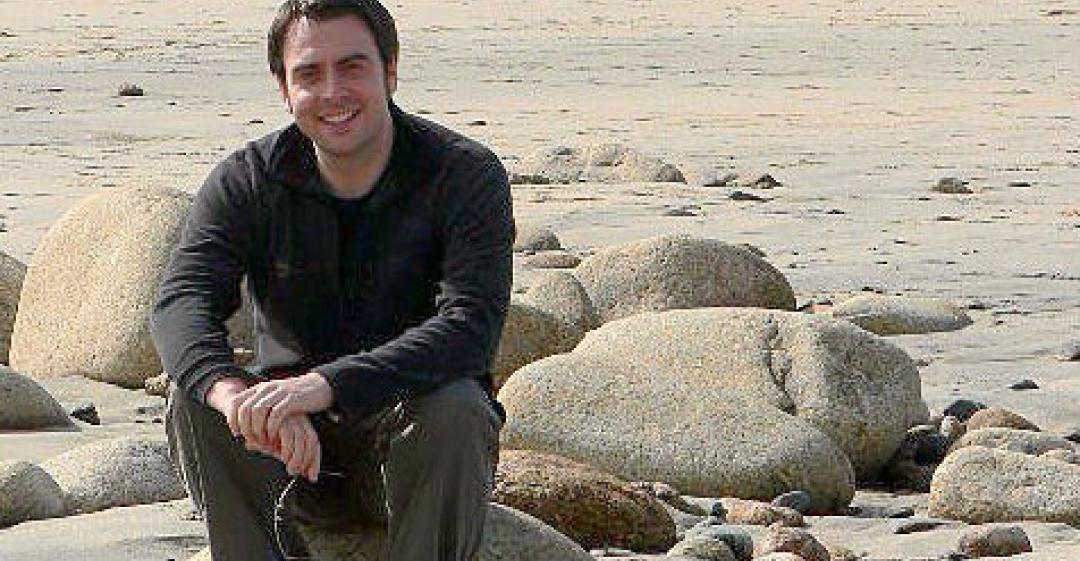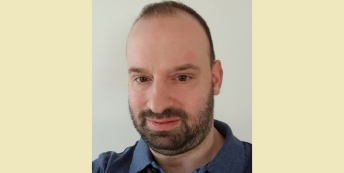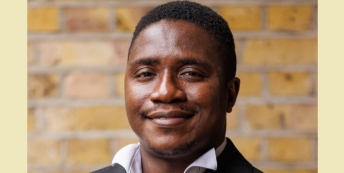“I started to become afflicted by a queasy feeling that my work life was a sham.”

What was the job you had before you made a career change?
Until recently I was a retail and property market strategist.
I worked at a senior level, directing and guiding the rapacious market led growth of retail chains, institutional investors and property developers. As a retail and property expert, I have played my part in the development of countless retail outlets, shopping destinations and retail parks that have mushroomed across the UK.
Until recently my world revolved around one key concept, that of profit and the continual drive to invest capital effectively.
There is no doubt that I have been successfully employed however beneath a calm and confident exterior I harboured serious doubts about my industry, job and future.
What was it that made you want to change career?
I have always appreciated the importance of careers that make a real, tangible difference to society.
As a kid I was fascinated by nature and the environment, enjoyed exploring the great outdoors and held strong views on everything from destruction of habitats to run away pollution.
These interests have never left me, in fact they’ve grown and become more sophisticated. However as I grew older I tended to regard the urge to ‘save the planet’ as somewhat naïve.
By the time I was an energetic and impatient graduate I had managed to suppress these values and ploughed head-long into a commercial career. Back then my belief was that work was just about one thing: money.
As I arrived at the grand old age of thirty, more experienced, and realistic, I started to become afflicted by a queasy feeling that my work life was a sham. I could no longer ignore the fact that my personal values were at odds with the corporate way.
I also saw that I had unconsciously segregated my life by pursuing all the things that made my heart sing at the weekends, such as growing food, keeping hens and trying to live a sustainable existence. These interests made me come alive but I had left them at the office door, every single day.
My work just wasn’t an authentic expression of my values, beliefs and ambitions.
It turns out that my simple childhood interests were not just whimsy, but a vital ambition.
What was it that made you finally take action and make your career change happen?
Several years of negativity and anxiety about my position ate away at my confidence and became quite debilitating; my disposition began to threaten personal relationships and my general outlook on life.
Conflicting emotions ebbed and flowed but they built so much momentum that change was the inevitable consequence. All that was required was a trigger. I hadn’t expected mine to be pink, noisy and baby shaped.
Most of us can look back at our lives and identify ‘threshold’ moments; times when we step through a new ‘doorway’ and things are never the same again. The birth of my daughter was one such event, joyous, and bewildering, I have never experienced a finer demonstration as to what life is really about.
She took me by the shoulders, shook me, slapped me several times and elicited the unselfish perspective I needed (my wife was weeks away from applying the same treatment and not in the metaphorical sense). The procrastination and moaning had run their course and I realised that it was time for me to find my way.
I owed it not only to myself but to my ever-suffering and expanding family.
Did you know what you wanted to do?
Frankly, I hadn’t a clue.
However I did have a strong set of values and interests and I felt that these held the key to my new life.
How did you figure out the career that was right for you?
My first move was to get a handle on what makes me tick.
I realised that I needed to articulate my ambitions and values, and to clear the fog of confusion, which had plagued me for so long. This was an amazingly cathartic exercise and I drew up a fine set of ‘guidelines’ which speak about me and capture the essence of what I want from life:
-
Make a purposeful and learning contribution – in a way that matters to me
-
Connect to the ‘real world’ – work with the natural environment
-
Explore the boundaries – pursue variety, explore the world and challenge myself
-
Tap into natural creativity – generate ideas, pursue my interests
The articulation of these values reconnected me to my old passion for the natural environment, and fascination for understanding how our world works, connects and behaves.
I realised that my position could be found helping to mitigate some of the worst impacts on our planet, so that we have a sustainable and healthy future. While not proposing to save the Earth single-handedly, I knew I wanted to do my bit.
I used the internet and industry publications to explore several areas of interest such as corporate sustainability, green planning and environmental advocacy. I quickly gathered too much information and realised that the key was to actually speak with people who work day in day out in these different areas.
I used my extended network to make contact with a number of really interesting people (it was surprising how closely linked these people were), but when this couldn’t help, I relied on good old fashioned cold calling. I was surprised and heartened that the majority of people were very happy to talk to me. It seemed that once they realised that you didn’t wish to sell them something they were very open and generous with their time.
I ruled out ‘technical’ careers and decided that my future lay in the generation of strategy and insight. I wanted to work at the heart of environmental strategy and policy, creating future solutions and therefore honouring my values. I also realised that I could transfer many of my existing skills such as project management, analysis and planning into this area.
However, my values also got me thinking seriously about my lifestyle. I was on the fast-track to burning out, vehemently disagreed with the principles of my industry, and needed a change of pace.
As a result I will soon start a twelve month, self imposed sabbatical in Edinburgh, where I will study for an MSc in Ecological Economics. This year out will allow me to learn new skills, reenergise and work up future opportunities.
Where did you find your inspiration?
I learnt much from two members of my family, now both sadly departed.
They put their ambitions and hearts before more material concerns, led fulfilling and accomplished lives and contributed greatly to their respective fields. I have been greatly inspired by their example.
I also stumbled across the Careershifters website and discovered that I was far from alone. I saw that there are many people out there, from all walks of life, trying to achieve a meaningful career and life transition.
The examples presented on the site demonstrated that many people were making tough and brave decisions in order to build a better future.
Where did you find help, guidance and support?
I would heartily recommend seeking objective advice.
I followed a link from an article on Careershifters to Rosie Walford, a creative strategist and career coach, who I worked with for eight months.
What has been the hardest part about changing career?
Everything would be the short answer!
However, dealing with anxiety and fear has probably been the most difficult part of this process. There have been many low points when my imagination runs away with itself, conjuring all sorts of terrible future scenarios. These typically involve fears of making the wrong choice, not finding a great job or not having enough money.
It is only natural to worry, yet when I examined these fears in detail I could see that they were fundamentally irrational. No-one can predict what will happen in the future.
How have you handled finances?
I must admit that the thought of leaving a well paid job to undertake an unpaid year of study has been quite a worry.
However I have put things in to perspective and realised that no matter how much money I earn in my old career, I will never find the career fulfilment that I seek. Therefore I must invest my resources in a brighter future rather than the safer, but considerably duller present.
In a rare example of foresight I began to save money several years ago (for a rainy day), not much, but enough to cover most of my year off. However I will still need to be thrifty.
I have also started to explore a long held desire to become a bit of an entrepreneur and recently decided to offer my services for occasional consulting within my old area of expertise. I am at the early stages of this particular ’project’, but it is opening my eyes to the exciting possibility of undertaking a portfolio career.
I am now thinking about different models of working in the future, and the thought of running my own business focused upon sustainable economic development is very appealing.
What has been unexpected?
I was worried that my family might react badly to my decision to change my life so completely and I kept my plans secret for quite some time.
However this fear proved to be unfounded because once I explained my motivation, I received nothing but support.
I also expected my colleagues not to understand, however almost everyone has commended the bravery of the decision to transform my career path.
Perhaps the greatest surprise was that while I felt alone in my desire for change, lots of colleagues and friends have now confided in me that they wish they could so something similar!
Another interesting surprise was that as my transition gained momentum I rediscovered interests and ambitions, long buried by years of negativity and anxiety. The fact that I have decided to finally learn French and start writing for pleasure is a testament to the liberating power of positive thinking.
How has your life changed now that you’ve changed career?
My life is beginning to change.
I have regained an inner confidence and know that by following my strongest values I am heading in the right direction. The journey isn’t over yet, but I’m not looking back!
What advice would you give to someone that wants to change career?
I have learnt much over the last eight months but there are five tips that I would give to a fellow career shifter:
This is particularly important, if like me you really have no idea what to do with yourself. I found that the tools and structure offered by a good life and career coach helped me to break free from seriously limiting beliefs and habits.
A strong set of values that speak for you and your ambitions act as a set of guiding principles. They provide an aim and structure your search.
Career transition is a major undertaking and most of us will worry and encounter fears along the way. It is important to put a small moment of consciousness between the trigger and reaction. This allows you to deal with these fears in a logical and clinical manner.
By acknowledging what is true, false, or unknown about your fear you can address it and move on. There is often little truth to be found in our worst fears.
Research is important but it is crucial to speak to people and get an insider’s view. I was surprised just how open and welcoming people were when asked to talk about their jobs.
Good quality research takes time. It took me eight months to decide upon my direction and I know that I’ll still be working on my transition for at least another year. However good ground work has ensured that I am well prepared for whatever the future holds.
What lessons could you take from James' story to use in your own career change? Let us know in the comments below.



